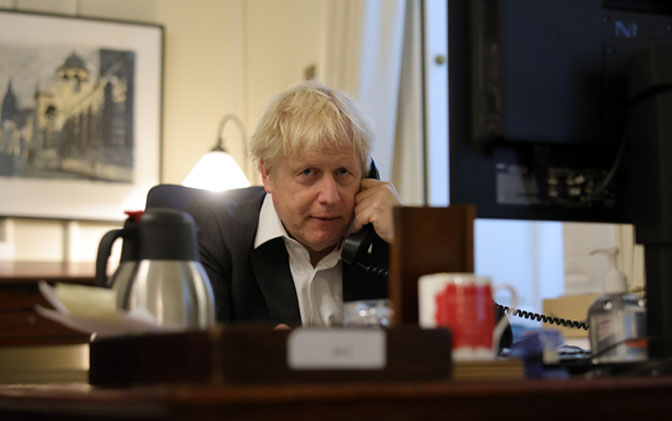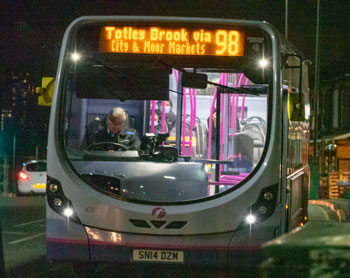
We all know that in workplaces where trade unions are recognised and trained safety reps are allowed to operate, workers are safer, healthier and better paid.
So why, during one of the most virulent pandemics in recent history, have the talents and knowledge of workplace health and safety reps not been embraced by government ministers and enforcement agencies? Surely the safety, health and wellbeing of workers have not been sacrificed on the altar of ideological hostility towards trade unions?

KEEP WORKING While the UK government demanded the public keep a safe distance, throughout the pandemic it has insisted at least half the workforce should congregate en masse at work. A year after the start of the pandemic, 68,000 members of the public had been fined for lockdown breaches. But despite thousands of workplace outbreaks affecting tens of thousands of workers, not a single employer was fined. Only two – an oil rig and a construction site – had work stopped while Covid breaches were remedied. Inaction was by design – most of HSE’s workplace visits, were not HSE visits at all, but tick-box spot checks outsourced to two debt collection firms.
It is true that trade unions have played a formidable part in keeping workers safe during the pandemic. But not at the request of the UK government, despite laws and regulations specifying the role safety reps should play at work.
When it came to schools reopening too early teaching union NEU, for instance, advised members of their legal rights, reminded employers of their legal duties and was instrumental in not one but two u-turns by the government.
And teachers expressed their gratitude by joining the ranks of the NEU in droves. Plus they tuned in to NEU zoom meetings – at least one of which attracted 400,000 viewers.
Workers wanted to hear from trade unions, so why not the government? Boris Johnson’s government and the Health and Safety Executive (HSE) excluded the UK's nearly 100,000 trained trade union health and safety representatives from its 'Covid-secure' strategy.
Other comparative economies adopted a co-enforcement approach with the State and trade unions working together to ensure the health and safety of those at work
[See: Cannon fodder].
Shielding employers
It’s a shame these models that work well internationally were not considered in the UK. Instead, in May 2020, Boris Johnson declared workplaces ‘Covid-secure’ and reassured workers that this would be enforced through a £14m package for HSE 'spot checks' (Hazards 151).
But new research from the Institute of Employment Rights (IER) has found strong evidence that risk was not sufficiently mitigated in workplaces because Covid-19 rules were not adequately enforced. The thinktank’s analysis of the government's strategy reveals an underfunded, light-touch approach through an understaffed agency which failed to regulate the risk to workers and, by logical extension, to communities.
The risk of Covid-19 transmission in the workplace was dangerously downplayed by the UK government. The magnitude of this risk has since been borne out by large workplace outbreaks while the government's underwhelming response is reflected in the complete absence of prosecutions of employers known to be breaking Covid rules.
Andy McDonald, the shadow secretary for employment rights and protections, commented: “In a time of national crisis it is more important than ever that the government’s actions are held up to scrutiny. The findings of this report are deeply concerning – if health and safety laws and Covid-19 rules are not enforced, they are not worth the paper they are written on.”
Welcoming the IER report, the Labour shadow cabinet member added: “When a deadly disease sweeps the country we need worker protections more than ever, yet the government has effectively shielded employers from prosecution even while coming down hard on individual citizens who break the same rules. The workers affected – and those in our emergency services and NHS who fought to save their lives – deserve answers as to how this was allowed to happen.”
Public inquiry
“When the pandemic was declared on 11 March 2020, the government had to decide how it would balance the protection of public health with the protection of the economy,” said Phil James, a professor of employment relations at Middlesex University and editor of the IER report.
“A year later, our analysis suggests it got that balance wrong. Our jobs are among the most important features of our lives, but they are not worth our lives, nor are they worth the lives of colleagues, family and friends. This light-touch approach to the regulation of businesses during the worst pandemic we have seen in 100 years must now be subject to a major independent public inquiry to understand what went wrong and how we can do better.
“It is vital that we learn from the failings of workplace regulation over the last year, because this pandemic proves that workers' health is also public health – it benefits us all.”

DISPOSABLE Bus drivers, along with health and care workers, food workers and those in a wide spread of other jobs, suffered greatly increased death rates from Covid-19. “Our jobs are among the most important features of our lives, but they are not worth our lives,” said IER report editor Professor Phil James.
Lord John Hendy QC, chair of the IER and a co-author of the report, said: “Something has gone very badly wrong when enforcement action has been taken against tens of thousands of members of the public and holidaymakers are threatened with 10 years in jail but employers known to have put thousands of people at risk are getting off scot free.
“There has been health and safety legislation on the UK's statute book for over 200 years. The current regulations are well known and could have been reasonably and effectively applied to protect workers. They were not. Had employers been reminded of their legal duties and these laws enforced through robust inspections and effective penalties, workplaces could have been made a lot safer than Covid-19 has shown them to be."
Forceful response
The IER report identified a number of key issues at fault in the UK’s regulatory framework during Covid.

IER news release and recommendations. HSE and Covid at work: A case of regulatory failure [preview], IER, March 2021. Purchase details.
First, on enforcement, government ‘guidance’ to employers was not backed by the full force of law and legal duties to workers were consistently downplayed. The legislation that already exists was barely mentioned in the guidance given to businesses.
Second, a severe lack of resources to HSE including a 58 per cent cut in funding over last 10 years and a 36 per cent reduction in staffing, lead to an inevitable decline in workplace inspections in 2020, down 40 per cent on the same period in 2019 – despite the lethal threat posed by the pandemic.
Third, the privatisation and outsourcing of enforcement. Accompanying the comparatively modest additional government contribution of £14m to HSE was an instruction that the money could not be used to train new inspectors.
So more than half was siphoned off to private companies to 'inspect' employers by phone from call centres staffed by untrained workers who made 15-minute, scripted phone-calls to employers. So, we ask again. Why was the UK's richest health and safety resource – nearly 100,000 trained trade union health and safety reps – not embraced during this pandemic?
The government has much to answer for.
IER’s 10 recommendations for work safety reform
| • | An urgent and major independent public inquiry into the future of the regulation of safety and health at work in the UK, with a focus on creating a regulatory system that will better protect the health and safety of all workers in the UK, now and in the future. |
| • | A significant increase in investment in the HSE to promote stronger enforcement of legal protections. |
| • | A comprehensive review of enforcement strategies employed by the HSE and local authorities, including a critical examination of the – currently rare and diminishing – use of legal sanctions. |
| • | Ensure the political independence of the HSE by considering its reconstitution in line with the United Nations’ Paris Principles, which require the involvement of representatives from civil society and the ringfencing of adequate funds to prevent government from imposing its political beliefs through budgetary controls. |
| • | Strengthen trade union safety representatives’ rights to access workplaces, undertake preventive work and support the enforcement of the law, such as issuing of improvement notices and bringing private prosecutions. |
| • | Enhance existing safety representative rights on provision of information, consultation, and training, including paid time off to undertake it. |
| • | Reform the current statutory framework to better protect workers in modern, more casualised, forms of employment, including the gig economy. |
| • | Reform and enhance current laws permitting workers to stop work in conditions of serious and imminent danger, under Sections 44 and 100 of the Employment Rights Act. |
| • | Consider adopting international models of co-enforced oversight, that involve State regulators working alongside trade unions and other civil society organisations to monitor and enforce compliance with legal standards. |
| • | Explore the value and application of supply chain regulation under which powerful supply chain actors have duties to ensure they support effective health and safety management and compliance in supplier organisations. |
COMPLETE FAILURE
As lockdowns came and went, work continued, and workers fell ill with Covid-19. Thousands died. Carolyn Jones and Sarah Glenister of the Institute of Employment Rights (IER) reveal how the pandemic exposed the fatal flaws in a workplace safety system neutered by UK government cuts and a refusal to harness the union safety effect.
| Contents | |
| • | Introduction |
| • | Shielding employers |
| • | Public inquiry |
| • | Forceful response |
| • | IER’s 10 recommendations for work safety reform |
| Hazards webpages | |
| • | Hazards news |
| • | Infections |
| • | Work and health |
| • | Deadly business |
 See the dedicated Hazards coronavirus resources pages.
See the dedicated Hazards coronavirus resources pages.
